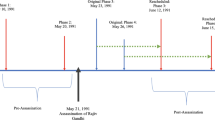Abstract
The alternative vote (AV) is a preferential electoral system that tends to reward political moderation and compromise. Fraenkel and Grofman have modeled the likely effects of AV in severely divided societies, in order to impugn AV as a tool of interethnic accommodation. In this response, I show that Fraenkel and Grofman’s model is based on extreme assumptions that bear no relation to party and voter behavior in such societies. Models based on realistic assumptions about strategic behavior and cross-national experience with AV both demonstrate that AV generally provides centripetal incentives that can contribute to interethnic coalition-building and accommodation.
Similar content being viewed by others
REFERENCES
Bean, C. (1986). Electoral law, electoral behaviour, and electoral outcomes: Australia and New Zealand compared. Journal of Commonwealth and Comparative Political Studies, 24, 57–73.
Bean, C. (1997). Australia’s experience with the alternative vote. Representation, 34, 103–110.
Cox, G. W. (1990). Centripetal and centrifugal incentives in electoral systems. American Journal of Political Science, 34, 903–935.
Fraenkel, J., & Grofman, B. (2004). A neo-Downsian model of the alternative vote as a mechanism for mitigating ethnic conflict in plural societies. Public Choice, 121, 487–506.
Graham, B. D. (1962). The choice of voting methods in federal politics, 1902–1918. Australian Journal of Politics and History, 8, 164–181.
Horowitz, D. L. (1990). Ethnic conflict management for policymakers. In J. V. Montville (ed.), Conflict and peacemaking in multiethnic societies. Lexington, MA: Lexington Books.
Horowitz, D. L. (1991). A democratic South Africa? Constitutional engineering in a divided society. Berkeley: University of California Press.
Horowitz, D. L. (2000). Ethnic groups in conflict. Berkeley: University of California Press.
Horowitz, D. L. (2002). Constitutional design: Proposals versus processes. In A. Reynolds (ed.), The architecture of democracy. Oxford: Oxford University Press.
Johnston, R. J. (1984). Seats, votes, redistricting, and the allocation of power in electoral systems. In A. Lijphart, & B. Grofman, (eds.), Choosing an Electoral System. New York: Praeger.
Lijphart, A. (1977). Democracy in plural societies. New Haven, CT: Yale University Press.
Niou, E. (2001). Strategic voting under plurality and runoff rules. Journal of Theoretical Politics, 13, 209–227.
Nordlinger, E. (1972). Conflict regulation in divided societies. Cambridge, MA: Harvard University Center for International Affairs Occasional Papers in International Affairs, No. 29.
Reilly, B. (2001). Democracy in divided societies: Electoral engineering for conflict management. Cambridge, UK: Cambridge University Press.
Reilly, B. (2002). Political engineering and party politics in Papua New Guinea. Party Politics, 8, 701–718.
Sharman, C., Sayers, A. M., & Mirgliotta, N. (2002). Trading party preferences: The Australian experience of preferential voting. Electoral Studies, 21, 543–560.
Tarte, S. (2000). Fiji. Contemporary Pacific, 12, 507–515.
Author information
Authors and Affiliations
Rights and permissions
About this article
Cite this article
Horowitz, D.L. The alternative vote and interethnic moderation: A reply to Fraenkel and Grofman. Public Choice 121, 507–517 (2004). https://doi.org/10.1007/s11127-004-2488-y
Issue Date:
DOI: https://doi.org/10.1007/s11127-004-2488-y




